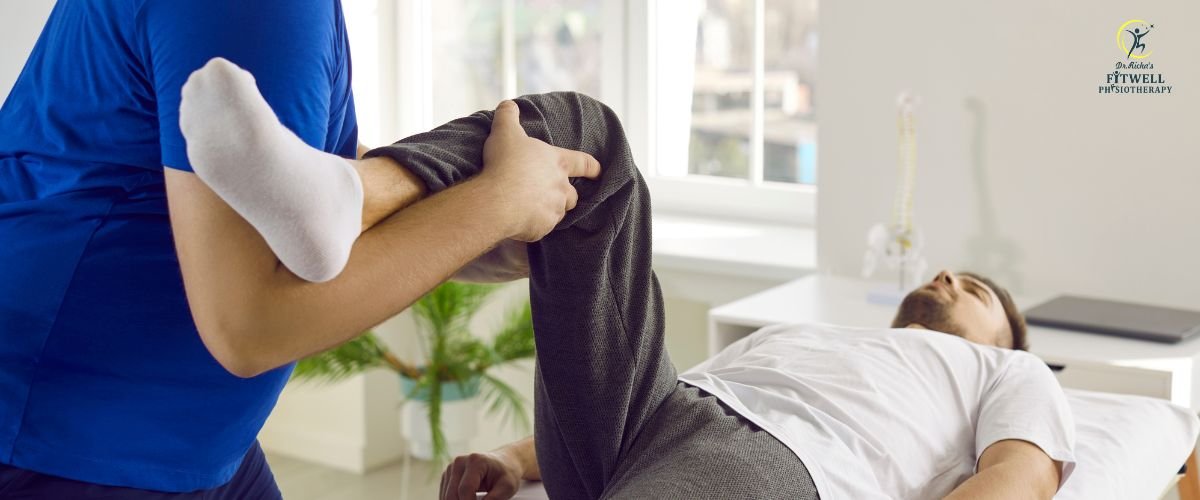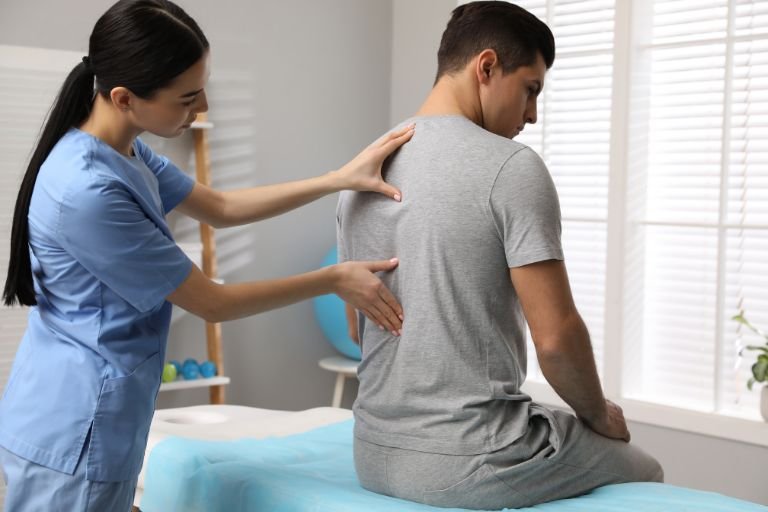- Fitwell Physiotherapy
Knee Pain

Understanding Knee Pain: Symptoms, Causes, Treatment, and Prevention
Knee pain is a common complaint that can affect people of all ages and lifestyles. It can be caused by a variety of factors, ranging from acute injuries to chronic conditions, and it can significantly impact mobility, function, and quality of life. In this guide, we’ll explore the symptoms, causes, treatment options, and prevention strategies for knee pain.
Please submit your details below.
Symptoms of Knee Pain:
- Pain, ranging from mild discomfort to severe agony, that may be localized to the knee or radiate to surrounding areas.
- Swelling, inflammation, or stiffness in the knee joint.
- Difficulty bearing weight on the affected knee or performing activities such as walking, climbing stairs, or bending the knee.
- Clicking, popping, or grinding sensations (crepitus) when moving the knee joint.
- Instability or weakness in the knee, feeling like the knee may give out or buckle.
Causes of Knee Pain:
- Injuries: Acute injuries such as ligament sprains, meniscus tears, or fractures can cause sudden knee pain. Overuse injuries, such as runner’s knee or patellar tendinitis, can result from repetitive stress on the knee joint.
- Degenerative Conditions: Osteoarthritis, a degenerative joint disease, is a common cause of chronic knee pain, especially in older adults. Other degenerative conditions such as rheumatoid arthritis or gout can also affect the knee joint.
- Poor Biomechanics: Abnormalities in the alignment or mechanics of the knee joint, such as malalignment of the kneecap (patellar maltracking) or flat feet (pronation), can lead to increased stress on the knee and contribute to pain.
- Overweight or Obesity: Excess body weight can put added pressure on the knee joint, increasing the risk of knee pain and degenerative conditions such as osteoarthritis.
- Medical Conditions: Certain medical conditions such as bursitis, tendonitis, or cysts can cause inflammation and pain around the knee joint.
When to See a Physiotherapist:
It’s important to consult a physiotherapist if you experience persistent or severe knee pain, especially if it interferes with daily activities or worsens over time. Additionally, you should seek medical attention if you experience any of the following symptoms:
- Severe pain, swelling, or bruising around the knee joint.
- Inability to bear weight on the affected knee or severe limitations in mobility.
- Locking or catching sensations in the knee joint.
- Signs of infection, such as redness, warmth, or fever.
Risks Associated with Untreated Knee Pain:
Untreated knee pain can lead to a range of complications, including:
- Increased risk of falls or injuries due to instability or weakness in the knee joint.
- Progression of underlying degenerative conditions, leading to worsening pain and functional impairment.
- Decreased mobility and limitations in daily activities, impacting quality of life and independence.
- Development of compensatory movement patterns or muscle imbalances, increasing the risk of further injury or pain.
How to Prevent Knee Pain:
- Maintain a healthy weight to reduce stress on the knee joint.
- Engage in regular exercise to strengthen muscles around the knee and improve joint stability.
- Practice proper body mechanics and techniques during physical activities to minimize the risk of injury.
- Use appropriate footwear and equipment for sports or activities to provide adequate support and cushioning for the knee joint.
- Avoid overuse or repetitive stress on the knee joint by incorporating rest days and cross-training activities into your fitness routine.
- Perform regular stretching and flexibility exercises to maintain joint mobility and prevent muscle tightness or imbalances.
Treatments for Knee Pain:
- Physiotherapy: Physiotherapy plays a central role in the treatment of knee pain, focusing on alleviating symptoms, improving joint mobility, and strengthening supporting muscles. Physiotherapists use a combination of manual therapy, exercise therapy, modalities, and education to address underlying factors contributing to knee pain and promote recovery.
- Medications: Over-the-counter or prescription medications such as nonsteroidal anti-inflammatory drugs (NSAIDs), analgesics, or corticosteroid injections may be used to reduce pain and inflammation associated with knee pain.
- Bracing or Supportive Devices: Knee braces, orthotics, or supportive devices may be recommended to provide stability, reduce stress on the knee joint, and alleviate pain during physical activities.
- Injections: Injections such as corticosteroids, hyaluronic acid, or platelet-rich plasma (PRP) may be used to provide pain relief and promote healing in cases of severe or persistent knee pain.
- Surgery: In severe cases of knee pain or when conservative treatments are ineffective, surgical interventions such as arthroscopy, knee replacement, or ligament reconstruction may be considered to address underlying structural abnormalities or damage to the knee joint.
In conclusion, knee pain can have a significant impact on daily life, but with proper diagnosis, treatment, and preventive measures, it can often be managed effectively. If you’re experiencing knee pain, consult a physiotherapist or healthcare professional for a comprehensive evaluation and personalized treatment plan tailored to your specific needs and goals. Early intervention and proactive management are key to achieving optimal outcomes and maintaining knee health in the long term.
Frequently Asked Questions
Knee pain can result from various factors, including:
- Osteoarthritis: Degenerative wear and tear of the knee joint.
- Ligament injuries: Such as anterior cruciate ligament (ACL) tears or sprains.
- Meniscus tears: Damage to the cartilage cushioning the knee joint.
- Tendonitis: Inflammation of the tendons around the knee.
- Patellofemoral pain syndrome: Pain around the kneecap due to overuse or misalignment.
- Bursitis: Inflammation of the bursae, small sacs of fluid that cushion the knee joint.
Knee pain can cause discomfort, swelling, stiffness, and limited range of motion in the knee joint. It may affect your ability to walk, climb stairs, squat, or participate in physical activities, impacting your overall quality of life.
Physiotherapy offers various treatments to address knee pain, including:
- Manual therapy techniques like massage, joint mobilization, and soft tissue manipulation to reduce pain and improve knee mobility.
- Therapeutic exercises to strengthen the muscles around the knee, improve joint stability, and correct movement imbalances.
- Modalities such as heat therapy, cold therapy, or ultrasound to alleviate pain and reduce inflammation.
- Gait analysis and correction to address abnormal walking patterns that may contribute to knee pain.
- Education on proper biomechanics, posture, and injury prevention strategies to manage knee pain in the long term.
You should consider seeking physiotherapy if knee pain:
- Persists for more than a few days despite rest and home remedies.
- Interferes with daily activities or affects your ability to participate in sports or exercise.
- Is accompanied by other symptoms such as swelling, instability, or clicking or locking sensations in the knee joint.
- Recurs frequently or worsens over time.
- Is related to a recent injury, trauma, or underlying medical condition.
At-home remedies to relieve knee pain include:
- Resting and elevating the affected knee.
- Applying ice packs or cold compresses to reduce inflammation.
- Performing gentle stretching exercises to improve flexibility and reduce muscle tension around the knee.
- Using over-the-counter pain medications or topical creams to alleviate pain.
- Wearing supportive footwear and using orthotic inserts to provide cushioning and stability to the knee joint.
Related Symptoms
How Fitwell Physiotherapy Can Help?
Dr. Richa’s Fitwell physiotherapy has an extensive team of physiotherapists all within their own specialist areas of physiotherapy. Whatever your condition, we guarantee that we will have the best physiotherapist for you. We assess, diagnose, plan, cure and care for you.
Fitwell Physiotherapy Clinic, Pune provides you best physiotherapy treatment in Kharadi, pune. We also serve Chandan Nagar, Vadgaon Sheri, Keshav Nagar, Wagholi & nearby Areas in Pune. We are experts in treating Neck Pain, Hand Pain, Back Pain, Lower Back Pain, Knee Pain, Stiff Neck, Sciatica, Arthritis, Stroke Paralysis & Post Surgical Rehab.
We provide Specialized physiotherapy treatments in Sports Injuries, Pre and post Surgery, Neurologic, Pediatric, Chronic Pain/Fatigue, Rheumatology, Women’s Health, Men’s Health, Ergonomics, Vestibular, Amputees & all sort of Pain treatment and lifestyle conditions.
































